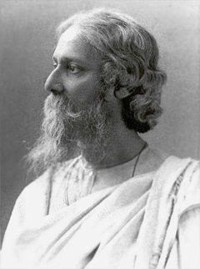Lifetime
Born: 07.05.1861Passed away: 07.08.1941
About
Rabindranath Tagore (Bengali: রবীন্দ্রনাথ ঠাকুর; Hindi: रबिन्द्रनाथ ठाकुर; 7 May 1861 – 7 August 1941), sobriquet Gurudev, was a Bengali poet, novelist, musician, painter and playwright who reshaped Bengali literature and music. As author of Gitanjali with its "profoundly sensitive, fresh and beautiful verse", he was the first non-European to be awarded the Nobel Prize for Literature in 1913. His poetry in translation was viewed as spiritual, and this together with his mesmerizing persona gave him a prophet-like aura in the west. His "elegant prose and magical poetry" still remain largely unknown outside the confines of Bengal.
A Pirali Brahmin from Kolkata, Tagore was already writing poems since he was eight years old. At age 16, he published his first substantial poetry under the pseudonym Bhanushingho ("Sun Lion") and wrote his first short stories and dramas in 1877. Tagore achieved further note when he denounced the British Raj and supported Indian independence. His efforts endure in his vast canon and in the institution he founded, Visva-Bharati University.
Tagore modernised Bengali art by spurning rigid classical forms. His novels, stories, songs, dance-dramas, and essays spoke to political and personal topics. Gitanjali (Song Offerings), Gora (Fair-Faced), and Ghare-Baire (The Home and the World) are his best-known works, and his verse, short stories, and novels were acclaimed for their lyricism, colloquialism, naturalism, and contemplation.
